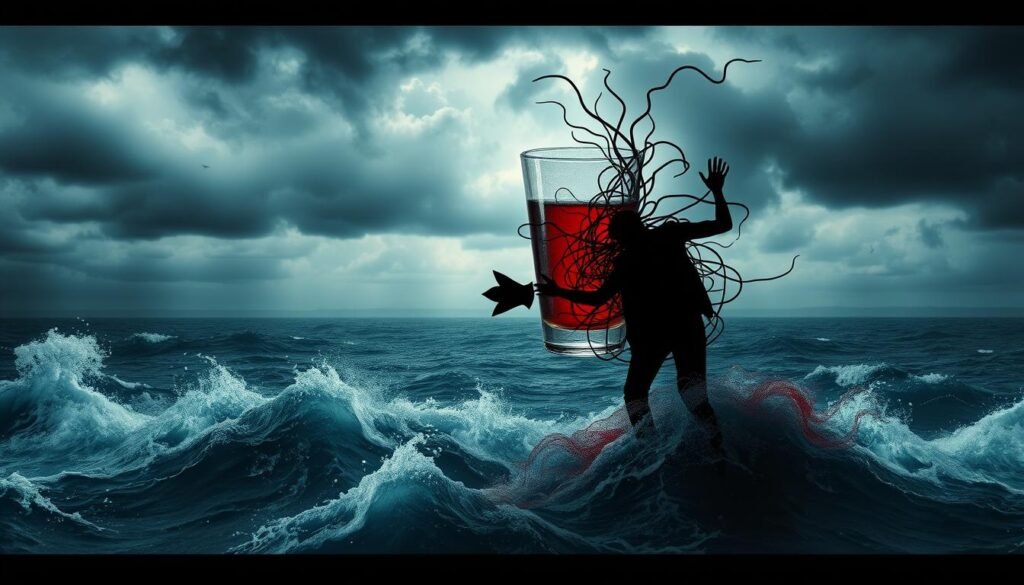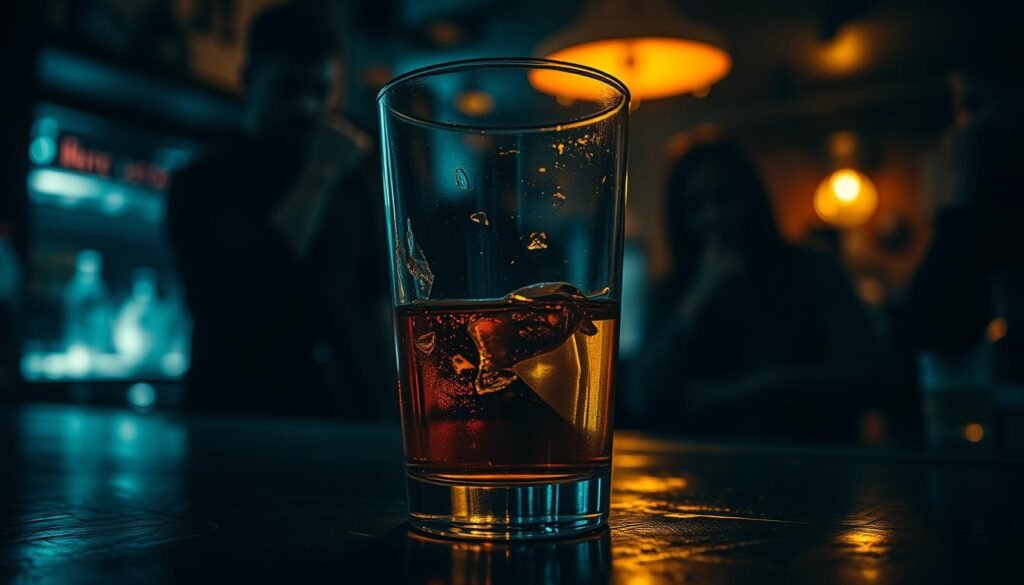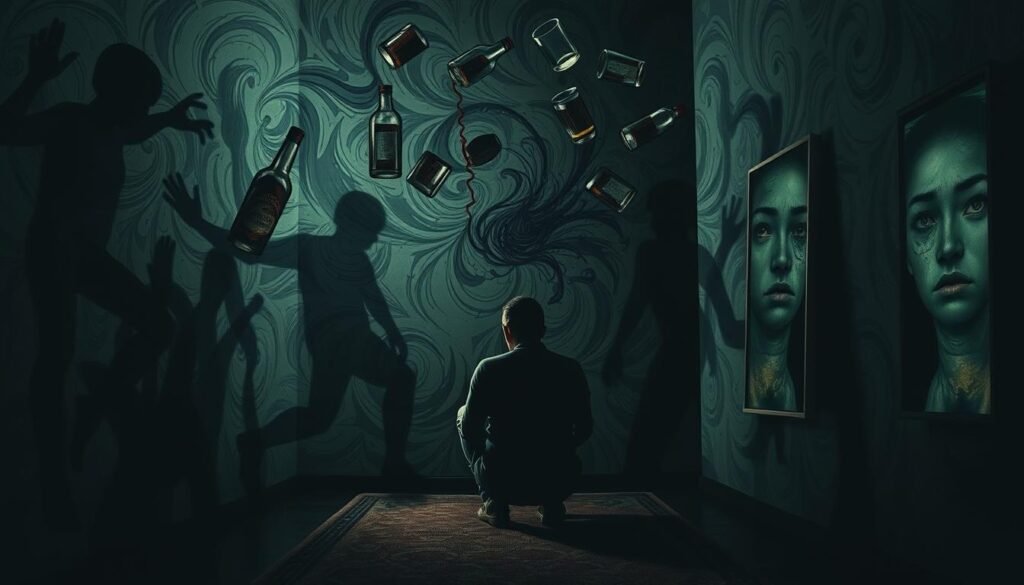Nearly one-third of adults in the US may struggle with alcohol use disorder (AUD) during their lives. This fact reveals a hidden link: alcohol’s impact on anxiety. Many people drink to feel better, but this can make anxiety worse.
Drinking too much can lead to stronger feelings of nervousness and regret, a state known as “hangxiety.” Understanding how alcohol and anxiety are connected is crucial. It helps us make sense of our anxieties and drinking patterns. This topic is very important for everyone to talk about.
Key Takeaways
- About 30% of those with substance use disorder also face another mental health condition.
- Alcohol can inhibit the body’s natural ability to calm down, potentially leading to panic attacks.
- Elevated cortisol levels in heavy drinkers can result in anxiety or restlessness.
- Experiencing “hangxiety” after drinking may indicate a more serious issue like alcohol dependence.
- Only a qualified healthcare professional can diagnose an alcohol use disorder or anxiety disorder.
- Alcohol-dependent women are nearly twice as likely to develop co-occurring anxiety compared to men.
The Relationship Between Alcohol and Anxiety
Many people use alcohol to relax. However, it often increases anxiety instead of reducing it. The link between alcohol and anxiety attacks is complicated. Studies show that too much drinking can make anxiety worse. About 3.1% of people in the U.S. have generalized anxiety disorder. Around 7% to 10% might be allergic to alcohol, affecting their use of it.
Stopping alcohol after regular use can lead to withdrawal. This includes more anxiety. This creates a harmful cycle. People drink to ease anxiety but end up feeling worse. Alcohol changes brain chemistry and mood, making anxiety stronger. It also ruins sleep and causes dehydration, adding to anxiety.
Many alcoholics suffer from depression and anxiety. Over a third of alcoholics have had severe anxiety. 40% have had panic attacks. Those with mood disorders may find their anxiety and depression spike after drinking.
It’s important to understand how alcohol and anxiety are linked. Knowing the signs of alcohol-induced anxiety can help manage drinking and anxiety. Addressing one can significantly affect the other.
Understanding Anxiety and Its Symptoms
Anxiety affects many people in different ways. You might feel restless, have a fast heartbeat, or find it hard to focus. Some individuals quickly move past these feelings. Yet, for others, their anxiety doesn’t go away easily, leading to more serious issues known as anxiety disorders.
In the U.S., around 40 million adults struggle with anxiety disorders. It’s vital to know the signs of anxiety disorder symptoms and how they affect lives. There are many forms of anxiety disorders, like generalized anxiety disorder (GAD), social anxiety, panic attacks, and phobias. These share common symptoms and are often linked to the body’s stress response.
Drinking alcohol can worsen anxiety. Although it might seem to help at first, alcohol can increase anxiety levels over time. It affects brain chemicals, making tension worse and possibly leading to panic attacks. This creates a harmful loop of alcohol anxiety, where calming effects turn into increased anxiety after the alcohol fades.
If drinking makes your anxiety worse, consider other ways to cope. Talking to a mental health expert is a good idea. Also, cutting down or stopping alcohol can help improve anxiety symptoms in weeks.

Does Alcohol Increase Anxiety: Exploring the Science
Many studies link alcohol with anxiety. They show how alcohol changes brain chemicals. This explains why drinking can lead to anxiety. Drinking may make you feel good at first, thanks to a serotonin boost. But later, your serotonin levels drop. This drop can make your mood worse and increase anxiety once you’re sober.
How Alcohol Affects Neurotransmitters
When you drink, it affects your brain’s neurotransmitters. For example, serotonin helps you feel happy, but too much alcohol lowers it. This creates a cycle of anxiety. After the happy effects of alcohol go away, you might feel more anxious than before.
The Role of GABA in Alcohol-Induced Anxiety
GABA is key in how we relax and deal with stress. Alcohol boosts GABA at first, making you feel relaxed. But drink too much and often, and your GABA levels will drop. This makes it hard to manage stress. You end up feeling anxious after drinking. Knowing this can help people find better ways to cope. It also helps in treating alcohol and anxiety issues. To learn more about stress and anxiety differences, click here.

What is Hangxiety?
Hangxiety is the anxiety felt after a night of too much drinking. It can last more than a day. This happens especially when your blood alcohol drops to zero. Symptoms include regret, panic, and a spike in anxiety. People with anxiety may find it gets worse with drinking.
Defining Hangxiety and Its Symptoms
Hangxiety shows up in emotional and physical ways. You might feel:
- Regret over past behaviors
- Increased heart rate
- Difficulty concentrating
- Panic attacks
Drinking too much can make your hangover worse. So, it’s key to know your limits. In Australia, it’s advised to stick to four drinks a day. And no more than ten drinks across the week. This helps reduce the anxiety after drinking.
Scientific Explanation Behind Hangxiety
Hangxiety is caused by changes in the brain due to alcohol. It messes with cortisol and neurotransmitters. These changes lead to increased anxiety once you’re sober. Mixing drinks with other substances can also make next-day anxiety worse. To ease alcohol anxiety, drink water, eat, rest, and avoid more alcohol.

Many people with daily anxiety drink to feel better. Around 20% of those with anxiety turn to alcohol. This can lead to alcohol dependency. If you’re facing hangxiety, it’s a good idea to think about your drinking habits. And look into healthier ways to cope.
For more info on hangxiety and how it affects you, check out this resource.
Can Alcohol Cause Panic Attacks?
It’s key to know how alcohol and panic attacks relate, especially for those feeling anxious. Alcohol changes brain chemistry. It acts like GABA, which helps calm us down. But as its calming effects fade, fewer GABA receptors are left. This imbalance can raise anxiety levels and may lead to panic attacks in those prone to anxiety issues.
Mechanisms Leading to Panic Attacks After Drinking
Several factors can cause panic attacks after drinking:
- Drinking to ease anxiety can backfire, making the anxiety worsen.
- Heavy drinking is linked to more severe panic attacks and long-term health issues.
- Around 25% of people with panic disorder also struggle with alcohol abuse.
- Withdrawal from alcohol can feel like anxiety, with symptoms like a fast heartbeat, nausea, and trembling.
- Hangovers can make anxiety worse, depending on how much was drunk before.
Studies show a two-way link between Alcohol Use Disorder (AUD) and anxiety. People with AUD might be more likely to have anxiety disorders, and vice versa. Half of the people treated for AUD may also be dealing with an anxiety disorder.
Knowing how alcohol affects anxiety can help people get the help they need. Tackling both alcohol use and anxiety can greatly better mental and physical health.
The Cycle of Alcohol Use and Anxiety
Anxiety and alcohol together can form a harmful cycle, affecting many people. This combination often leads people to drink more to manage their anxiety. Over time, this can make symptoms worse. Many look for treatments for alcohol-induced anxiety, not seeing the long-term harm of their actions.
How Drinking Can Exacerbate Anxiety Symptoms
Alcohol greatly impacts the brain and its chemicals, especially in the amygdala, key for handling stress and anxiety. Too much drinking, particularly in young people, can cause permanent changes. These changes can raise anxiety levels and may lead to alcohol use disorder. As dependence grows, withdrawal, cravings, and tolerance intensify, making drinking a go-to solution for relief and feeding into anxiety.
The Concept of Alcohol Use Disorder
It’s crucial to understand alcohol use disorder if you’re trapped in this cycle. Around half of those with an anxiety disorder also struggle with alcohol use disorder. Losing control over drinking and continuing despite harm can lead to deeper dependence. Treatments like cognitive-behavioral therapy (CBT) and dialectical-behavioral therapy (DBT) are effective in breaking this cycle and building better coping skills.
Treatment Options for Alcohol-Induced Anxiety
Addressing alcohol-induced anxiety requires tailored solutions. Various therapies and medications help manage anxiety symptoms, considering the challenges of alcohol use disorder. This offers effective relief for those affected.
Therapeutic Approaches for Managing Anxiety
Cognitive Behavioral Therapy (CBT) is a leading choice for those facing anxiety and alcohol issues. CBT works by identifying and reframing negative thoughts causing anxiety. Group therapy also proves beneficial, allowing individuals to share and learn coping mechanisms within a supportive community. These methods aim to address anxiety causes and decrease alcohol dependence.
Medications That May Help
Several medications show promise in treating alcohol-related anxiety and withdrawal symptoms. SSRIs, like paroxetine, helped 57% of participants in a study. However, benzodiazepines, although helpful short-term, could lead to dependence. Consulting healthcare professionals for the right medicine is crucial.
Early and broad treatment is key, notably for those with a family history of anxiety disorders. A mix of therapy and medication offers lasting benefits, particularly for women linking social anxiety with alcohol abuse. For more details, see this study on psychopharmacological treatments.
| Treatment Approach | Description | Effectiveness |
|---|---|---|
| Cognitive Behavioral Therapy (CBT) | Focus on changing negative thought patterns and behaviors. | High; helps in long-term management of anxiety. |
| Group Therapy | Peer support and shared experiences help reduce feelings of isolation. | Moderate; fosters a sense of community. |
| SSRIs (e.g., Paroxetine) | Medication that helps balance serotonin levels. | High; significant improvement seen in clinical trials. |
| Benzodiazepines | Short-term relief for acute anxiety symptoms. | Variable; risks of dependency noted. |
Rethinking Your Relationship with Alcohol
Looking at alcohol’s role in stress management can lead to better choices. Many use alcohol to ease anxiety temporarily, but this often leads to bigger problems. Problems like more anxiety and becoming dependent on alcohol. Finding other ways to deal with stress can lead to a happier, more balanced life.
Alternatives to Drinking for Stress Relief
There are many ways to relieve stress without the downsides of drinking. Consider these options:
- Exercise: Regular exercise can improve your mood and lessen anxiety.
- Mindfulness and Meditation: Mindfulness helps you find peace and clear thinking.
- Hobbies: Activities like painting, gardening, or reading are great escapes from stress.
- Social Connections: Having supportive friends and family provides emotional support.
Developing Healthy Coping Mechanisms
For those looking for lasting ways to handle stress, it’s essential to develop healthy coping methods. These methods are a big part of dealing with alcohol-related anxiety:
- Therapeutic Support: Counseling or groups like Alcoholics Anonymous offer help and a sense of community.
- Journaling: Writing your thoughts and feelings can offer emotional relief and insight.
- Setting Boundaries: Knowing when to avoid alcohol-heavy social events can keep you in control.
- Limit Social Interactions: Staying away from places where drinking is common can lead to healthier choices.
Understanding how drinking affects you mentally and physically can improve your choices. Resources like workplace anxiety solutions show how to manage stress well without alcohol.
Conclusion
Looking into how alcohol and anxiety are connected shows a deep issue. It’s clear that asking if alcohol raises anxiety isn’t simple. Studies show people with anxiety disorders are more likely to struggle with alcohol.
This isn’t just numbers. It highlights a big problem, especially for those with social or general anxiety disorders. The link between these problems is strong and concerning.
Drinking too much can make anxiety worse. This starts a harmful cycle known as alcohol anxiety disorder. The CDC warns about the dangers of drinking a lot.
Thinking about how drinking affects our feelings is critical. It’s important to know when alcohol is hurting rather than helping.
To deal with anxiety from alcohol, making changes is key. Getting help and finding better ways to cope are important first steps. For those struggling, focusing on mental health and the impact of alcohol can lead the way to a healthier life.